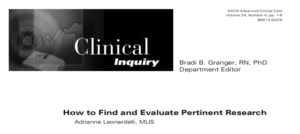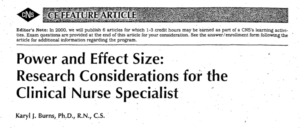How to Find and Evaluate Pertinent Research

Evidence-based practice (EBP) is a critical piece of the nursing profession puzzle. Evidence-based practice, which involves using the best available research in conjunction with clinical expertise, is essential to answering clinical questions and providing quality patient care.1 Thanks to EBP, the days of doing things “the way they have always been done” are long gone.
Power and Effect Size Research Consideration for the Clinical Nurse Specialist

Frequently, a goal for a Clinical Nurse Specialist (CNS) is to determine whether research results are clinically meaningful and appropriate for adoption into practice. Often the evaluation of research involves an examination of the efficacy and cost- effectiveness of the intervention under study. Attention to two concepts from research methodology- power and effect size- can help the CNS evaluate research findings and design studies to produce clinically meaningful results.

In clinical practice, nurses are expected to understand and implement the science that supports patient care, yet they fall short of goals to implement evidence in practice. One reason is difficulty in interpreting research results. Interpretation requires an ability to read and speak a language that many nurses have never masteredVthe language of data. This article presents a skill-based solution for use in nursing professional development to improve nurses’ understanding of statistics as a language.
The first task of an Editor is to look for good papers. Really good papers are few and far between, so most of an Editor’s time is spent looking at papers that are not as good as they might be, and trying to make them better.
© 2025 The Language of Data | All Rights Reserved